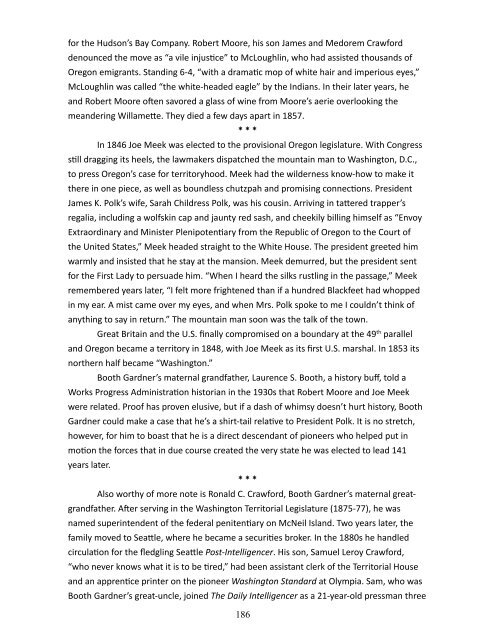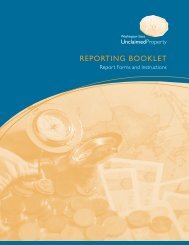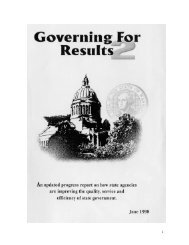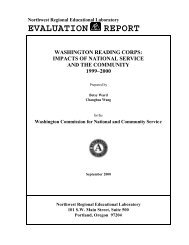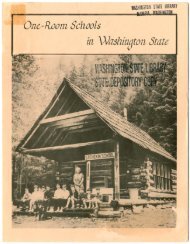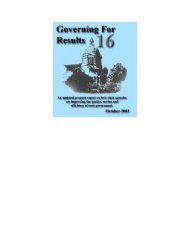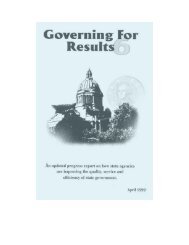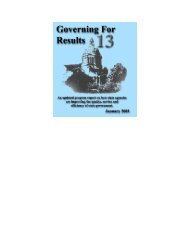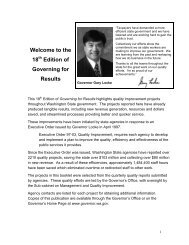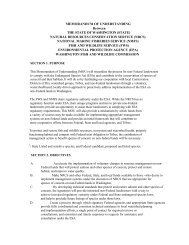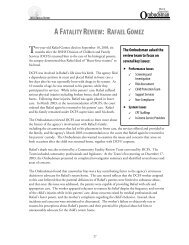BOOTH WHO? - Washington State Digital Archives
BOOTH WHO? - Washington State Digital Archives
BOOTH WHO? - Washington State Digital Archives
Create successful ePaper yourself
Turn your PDF publications into a flip-book with our unique Google optimized e-Paper software.
for the Hudson’s Bay Company. Robert Moore, his son James and Medorem Crawford<br />
denounced the move as “a vile injustice” to McLoughlin, who had assisted thousands of<br />
Oregon emigrants. Standing 6-4, “with a dramatic mop of white hair and imperious eyes,”<br />
McLoughlin was called “the white-headed eagle” by the Indians. In their later years, he<br />
and Robert Moore often savored a glass of wine from Moore’s aerie overlooking the<br />
meandering Willamette. They died a few days apart in 1857.<br />
* * *<br />
In 1846 Joe Meek was elected to the provisional Oregon legislature. With Congress<br />
still dragging its heels, the lawmakers dispatched the mountain man to <strong>Washington</strong>, D.C.,<br />
to press Oregon’s case for territoryhood. Meek had the wilderness know-how to make it<br />
there in one piece, as well as boundless chutzpah and promising connections. President<br />
James K. Polk’s wife, Sarah Childress Polk, was his cousin. Arriving in tattered trapper’s<br />
regalia, including a wolfskin cap and jaunty red sash, and cheekily billing himself as “Envoy<br />
Extraordinary and Minister Plenipotentiary from the Republic of Oregon to the Court of<br />
the United <strong>State</strong>s,” Meek headed straight to the White House. The president greeted him<br />
warmly and insisted that he stay at the mansion. Meek demurred, but the president sent<br />
for the First Lady to persuade him. “When I heard the silks rustling in the passage,” Meek<br />
remembered years later, “I felt more frightened than if a hundred Blackfeet had whopped<br />
in my ear. A mist came over my eyes, and when Mrs. Polk spoke to me I couldn’t think of<br />
anything to say in return.” The mountain man soon was the talk of the town.<br />
Great Britain and the U.S. finally compromised on a boundary at the 49 th parallel<br />
and Oregon became a territory in 1848, with Joe Meek as its first U.S. marshal. In 1853 its<br />
northern half became “<strong>Washington</strong>.”<br />
Booth Gardner’s maternal grandfather, Laurence S. Booth, a history buff, told a<br />
Works Progress Administration historian in the 1930s that Robert Moore and Joe Meek<br />
were related. Proof has proven elusive, but if a dash of whimsy doesn’t hurt history, Booth<br />
Gardner could make a case that he’s a shirt-tail relative to President Polk. It is no stretch,<br />
however, for him to boast that he is a direct descendant of pioneers who helped put in<br />
motion the forces that in due course created the very state he was elected to lead 141<br />
years later.<br />
* * *<br />
Also worthy of more note is Ronald C. Crawford, Booth Gardner’s maternal greatgrandfather.<br />
After serving in the <strong>Washington</strong> Territorial Legislature (1875-77), he was<br />
named superintendent of the federal penitentiary on McNeil Island. Two years later, the<br />
family moved to Seattle, where he became a securities broker. In the 1880s he handled<br />
circulation for the fledgling Seattle Post-Intelligencer. His son, Samuel Leroy Crawford,<br />
“who never knows what it is to be tired,” had been assistant clerk of the Territorial House<br />
and an apprentice printer on the pioneer <strong>Washington</strong> Standard at Olympia. Sam, who was<br />
Booth Gardner’s great-uncle, joined The Daily Intelligencer as a 21-year-old pressman three<br />
186


